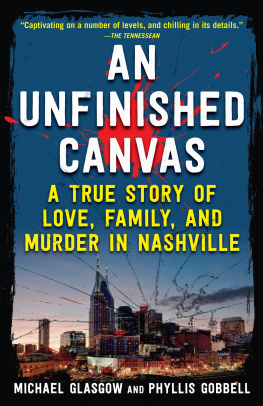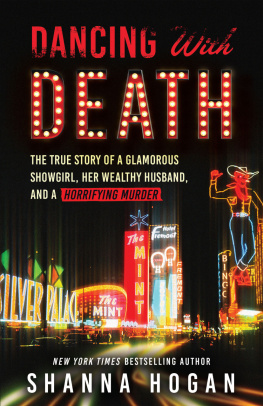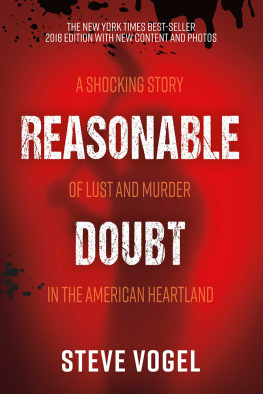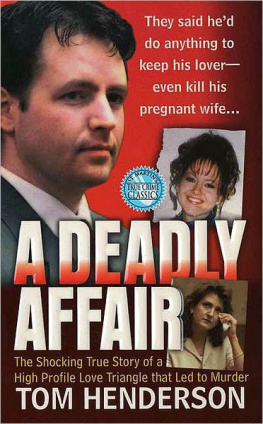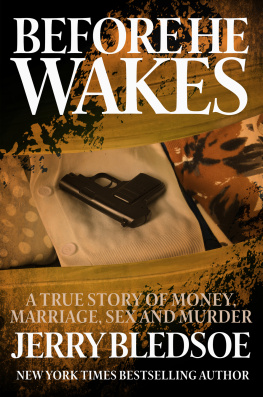True crime books are difficult for some people to read. There are those who dislike being faced with the realities of evil; they prefer their murders taking place in the hypothetical. There are others who have little patience for slogging through the details of what really happens in a courtroom; Perry Mason endings dont happen in true crime. And then there are readers who are distinctly uncomfortable with not knowing precisely who did what and why. In crime fiction everything is tidily wrapped up in the final chapter. In true crime, this is never the case. There always are a number of ends hanging loose: questions never satisfactorily answered; events never fully explained. The Craig Rabinowitz case was no exception.
At what point did Rabinowitz decide to kill his wife? What was it that drove him over the edge? Why did he think he could get away with it? How did he get Stefanie to ingest the sedative? Had there been a quarrel? At what point did she regain consciousness? Did Craig have her in the bathtub at the time? Or did she awaken on the couch, surrounded by baby Haleys toys? What was he doing during the two or more hours following the time she died, before he dialed 911? Did Summer truly get the answering machine when she called Rabinowitz at 11:30 that night? What really motivated him to change his plea?
Charlie Craig and Rich Peffall, who are as competent and conscientious as any investigators Ive met in thecourse of writing eight previous true crime books, dont know the answer to these questions. And it is highly unlikely that they ever will. Peffall makes an effort to contact many of the criminals he helps convict, asking them if they will help himfor his own satisfactionclear up some of the details that continue to nag. Often he gets no response. Sometimes they write back with obscene suggestions, recommending imaginative but impossible-to-perform activities. Occasionally, they actually answer some of his questions. Only rarely are the responses complete. And even when they are, who can tell for sure if the writer is being truthful, delusional, or simply self-serving?
Peffall says he intends to drop a letter to Craig Rabinowitz. He is curious about the Ambien: how he gave it to Stefanie and how it affected her. He would like to know at what point Rabinowitz quit thinking of his wifes murder as a possible alternative and definitely made up his mind to kill her. And hes inquisitive, in a less intense way, about where Rabinowitz was going with the Runaway-brand suitcase they found in the trunk of his car stuffed with summer clothes. Wherever it was, the detective says, recalling Jeffrey Millers comment that Rabinowitz had been planning to visit his mother at the New Jersey shore, it sure as hell wasnt Atlantic City.
Charlie Craig would like to know precisely how, when, and where the murder was committed and how long Rabinowitz had been planning it. When he bolted, was he going to take Haley with him, or was he just going to abandon her with one of her grandmothers? He also wonders what Rabinowitz contemplated doing with the insurance money, provided he got it. Was he looking at a future with Summer?
Peffall is highly doubtful that the exotic dancer would have played much more than a peripheral role in Rabinowitzs life even if he had gotten away with the murder and collected on the insurance. She would not have been wellacceptedin Rabinowitzs Main Line lifestyle, which ultimately was more important to Rabinowitz.
Although Rabinowitz failed to list Summer among his communicative ghosts, her presence continues to hover over the case.
One of the detectives major regrets is that they did not have an opportunity to conduct a second interview with the dancer. If they had, they would have pushed her further in order to learn whether she knew more than she had originally told them about Rabinowitzs plans for the murder. Peffall, particularly, would like to know more about the conversation that she and Rabinowitz had in the parking lot at Delilahs Den on May 2. The investigators wellhoned instincts made him wonder whether she was totally candid about the encounter. I dont believe he told her he killed his wife; I dont believe she knew he was going to do it. But I sure would like to know what they said.
Summer continued to make headlines in the Philadelphia newspapers long after Rabinowitz was shuffled off to his permanent prison in Houtzdale, a community of fewer than 2,000 people located almost in the center of the state. On December 4, the Inquirer had a story about Summers debut as an actressa role in a legitimate stage play entitled Porno Stars at Home , which was opening in a local dinner theater the day after Christmas.
The more colorful Daily News put a slightly different slant on the same story. Splashed over the entire front page was a close-up picture of the dancer with her tongue protruding between her front teeth. The headline read: Summer Gets a Tongue Lashing Stefanies mom: My daughters deadand dancer is promoting her career. Despite the headline, most of the story was devoted to Summer, who used the opportunity to slam the media for describing her as a stripper.
I hate that word, she said at a news conference called to introduce the plays performers. I am a woman of manytalents and I dont want to be stereotyped as a stripper.
On January 7, 1998, two weeks after the show opened, she was back on the News s front page. This time the headline read: Summers Over shes fired from Porno Stars show. The illustration featured another large close-up of Summers face, with a small insert photo showing four other performers and only a white, ghost-like image where Summers likeness should have been.
The story, by News theater critic Stu Bykofsky, began, It was a very brief Summer, and went on to quote producer Robert Barretta as saying that she had been fired because she was unwilling to do publicity for the production. Her excuse was that she had signed a contract with a tabloid tv show, American Journal, that prohibited her from talking to the media until after the show aired. Apparently Barretta was not upset about the turn of events. He claimed that her presence had drawn more hate mail than ticket orders.
When American Journal aired the Summer segment early in February, the Daily News story was hardly a rave review. Summer appeared at the studio for the taping with her lawyer, with whom she consulted during the filming, the newspaper said. Quoting people familiar with the taping, the News s Jim Nolan added, [she] used a strippers charm to try to control the interview, but off camera dropped the sweet facade to yell about questions she did not want to answer, such as whether she and Rabinowitz had ever had a sexual affair.
During the show, she claimed that she missed Rabinowitz and thought about him every day. According to her, Rabinowitz was the perfect man the perfect man in an unhappy marriage.







